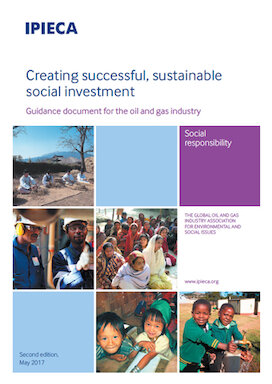This guidance document addresses the question of how to create successful and sustainable community investments and how to measure their success. Social investment programmes are described as the voluntary and/or regulatory contributions companies make to the communities and broader societies where they operate, with the objective of mutually benefiting external stakeholders and the company. The guidance was originally published in 2008, and was updated in 2017 to reflect the launch of three accompanying Practitioner Notes:
Creating successful, sustainable social investment (2nd edition)

Related resources
- 1 May 2017
This practitioner note discusses the main evolutions in social investment since the launch of Ipieca's guidance in 2008, shares observations from practitioners, and includes practical ways practitioners can analyse their situation and approach the issue.
- 1 May 2017
This practitioner note explores the challenges faced by companies as a result of increasing stakeholder demand for evidence-based reporting of social investment.
- 1 May 2017
This practitioner note provides an overview of the process for designing a social investment strategy, and explores the different phases of the oil and gas project life cycle and their implications for social investment.
- 25 September 2024
Undertaking ‘meaningful engagement’ not only enables companies to meet regulatory guidelines and international standards, but also build robust, constructive and reciprocal relationships with stakeholders.



